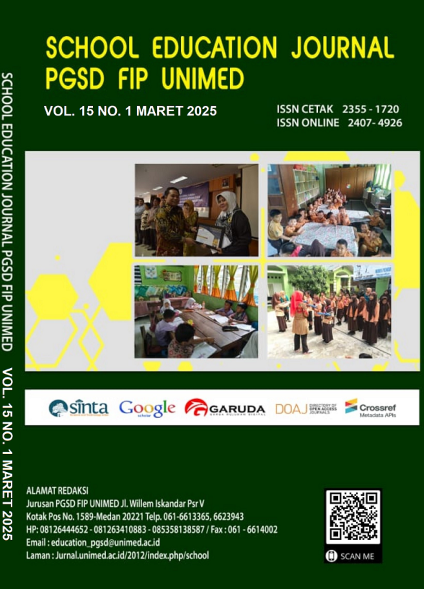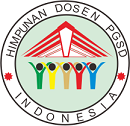PENERAPAN MODEL PEMBELAJARAN PROJECT-BASED LEARNING UNTUK MENINGKATKAN HASIL BELAJAR IPAS PESERTA DIDIK KELAS VI-B SD
DOI:
https://doi.org/10.24114/sejpgsd.v15i1.66295Keywords:
Learning Outcomes, Natural and Social Sciences, Project-Based LearningAbstract
This study aimed to determine the implementation of the Project-Based Learning model to improve natural and social sciences learning outcomes on the material of the six continents in the world. This research method is a classroom action research carried out in a cycle process. The subjects of this study were students of class VI-B of SDN 066650 Medan consisting of 20 students. Data collection techniques used observation, tests, and documentation. The use of the PjBL (Project-Based Learning) learning model can improve student learning outcomes, this is shown in the average value in cycle 1 is 55%, and in cycle 2 is 90%. So, it can be concluded that the results of science learning especially on the material six continents in the world increased after the Project-Based Learning model was applied in class VI-B SDN 066650 Medan.References
Amirul, I., N. (2024). Penerapan Model PjBL Berbantuan Aplikasi Canva untuk Meningkatkan Hasil Belajar Siswa SD Negeri 066650 Medan Kota. JPRONUS : Jurnal Pendidikan Profesi Guru Nusantara, 01(01), 8–17.
Arikunto, S. (2016), Prosedur Penelitian Suatu Pendekatan Praktik. Jakarta: Rineka Cipta.
Bell, S. (2010). Project-Based Learning for the 21st Century: Skills for the Future. The Clearing House: A Journal of Educational Strategies, Issues and Ideas, 83(2), 39-43.
Boss, S. (2015). Solutions for Digital Learner-Centered Classrooms: Implementing Project-Based Learning. United States of Amerika: Solution Tree Press.
Dolong, J. (2016). Pengembangan Model Pembelajaran Berbasis Masalah untuk Meningkatkan Kemampuan Berpikir Kritis Siswa. Jurnal Pendidikan dan Pembelajaran, 23(2), 123-134.
Halimatusyadiyah, N., Anasya, S. W., & Pajri, A. (2022). The Effectiveness of The Project-Based Learning Model In The Independent Learning Curriculum. Jurnal Kewarganegaraan, 6(2), 3.
Hernawati, Diana, Amin, M., Irawati, M., Indriwati, S., & Aziz, M. (2018). Integration of Project Activity to Enhance The Scientific Process Skill and Self-Efficacy in Zoology of Vertebrate Teaching and Learning. Eurasia Journal of Mathematics, Science and Technology Education, 14(6), 2475–2485.
Hidayati, R. (2019). Implementasi Project-Based Learning dalam Pembelajaran IPA di Sekolah Dasar. Jurnal Pendidikan Dasar Indonesia, 4(1), 15-25.
Kokotsaki, D., Menzies, V., & Wiggins, A. (2016). Project-Based Learning: A Review of The Literature. Improving Schools, 19 (3), 267–277.
Krajcik, J. S., & Blumenfeld, P. C. (2006). Project-Based Learning. In R. K. Sawyer (Ed.), The Cambridge Handbook of the Learning Sciences (pp. 317-333). Cambridge University Press.
Lozano, A., López, R., Pereira, F. J., & Blanco Fontao, C. (2022). Impact of Cooperative Learning and Project-Based Learning Through Emotional Intelligence: A Comparison of Methodologies for Implementing SDGs. International Journal of Environmental Research and Public Health, 19(24).
Morais, P., Ferreira, M. J., & Veloso, B. (2021). Improving Student Engagement with Project-Based Learning: A Case Study in Software Engineering. Revista Iberoamericana de Tecnologias Del Aprendizaje, 16(1), 21–28.
Sugiyarti, R., et al. (2020). Penerapan Model Pembelajaran Berbasis Proyek untuk Meningkatkan Hasil Belajar IPA. Jurnal Ilmiah Pendidikan, 7(3), 123-130.
Tanjung, D. S., Ambarwati, N. F., Juliana, & Prayuda, M. S. (2024). Application of the Problem Based Learning Model to Improve Students ’ Learning Outcomes and Critical Thinking Ability on Mathematics Lessons in Primary School. Jurnal Pa, 8(3), 307–318.
Tanjung, D. S., & Juliana. (2022). Pengaruh Model Pembelajaran Berbasis Proyek terhadap Hasil Belajar Matematika Siswa Sekolah Dasar. Elementary School Journal PGSD FIP Unimed, 12 (1), 37–44.
Tanjung, D. S., Juliana, & HS, D. W. S. (2023). Improving Fourth-Grade Students’ Learning Outcomes Using the Discovery Learning Method in Indonesian at SD Negeri 200111 Padangsidimpuan. Primary: Jurnal Pendidikan Guru Sekolah Dasar, 12(5), 1302–1313.
Tanjung, D. S., Mahulae, S., & Tumanggor, A. F. M. (2022). Pengaruh Model Pembelajaran Picture and Picture Berbantuan Media Audio Visual Terhadap Hasil Belajar Siswa. Jurnal Mutiara Pendidikan Indonesia, 7(2), 145–154.
Tanjung, D. S., Pinem, I., Mailani, E., & Ambarwati, N. F. (2024). Penelitian Tindakan Kelas (Pertama). Jambi: Sonpedia Publishing Indonesia.
Tanjung, D. S., Sembiring, R. K., & Habeahan, D. F. (2022). Pengaruh Penggunaan Gadget terhadap Hasil Belajar Siswa Pada Mata Pelajaran Bahasa Indonesia Kelas III di Sekolah Dasar Medan. School Education Journal PGSD Fip Unimed, 12(2), 176–184.
Tutiareni, T., Riyadi,Rakhmat, R. (2023). Implementasi Model Pembelajaran Project Based Learning Untuk Meningkatkan Hasil Belajar. Jurnal Penelitian Pembelajaran Matematika Sekolah, 7 (JP2MS), 209–218.
Winkel, W. S. (2018). Psikologi Pengajaran. Jakarta: Grasindo.
Yasma. (2019). Pengembangan Hasil Pembelajaran dalam Pendidikan. Jakarta: Pustaka Ilmu.
Published
Issue
Section
License
Copyright (c) 2025 SCHOOL EDUCATION JOURNAL PGSD FIP UNIMED

This work is licensed under a Creative Commons Attribution-ShareAlike 4.0 International License.
Authors whose manuscripts are approved are approved as follows:
- The publication rights for all journal manuscript materials published/published on the SEJ (School Education Journal) E-Journal site are held by the editorial board with the author's knowledge (moral rights remain with the manuscript authors).
- The formal legal requirements for accessing this electronic digital journal article are subject to the terms of the Creative Commons Attribution-ShareAlike (CC BY-SA 4.0) license, which means that E-Journal SEJ (School Education Journal) has the right to store, transfer media/format, manage in the form of a database, maintain, and publish articles without asking permission from the author as long as the author's name remains as the copyright owner.
- Manuscripts published/published electronically are open access for educational, research, and library purposes.













